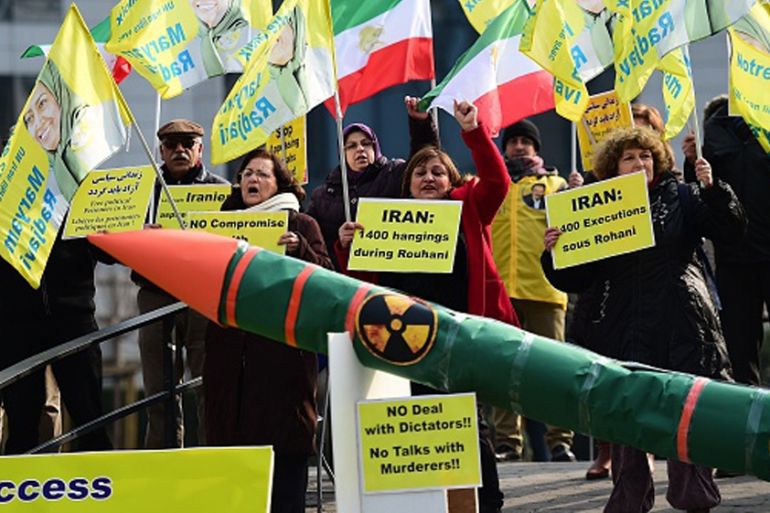No reason to be optimistic about Vienna talks
Even if the talks are successful, Tehran still remains a force for instability across the Arab world.

As the talks in Vienna over the fate of Iran’s nuclear weapons programme passes another deadline, speculation is mounting on what sort of deal will eventually be agreed. Of course, the White House and the State Department are quick to remind everyone that nothing is agreed until everything is agreed.
While this is true, nothing so far indicates that the agreement US President Barack Obama is seeking will improve global security or stop Iran from acquiring a nuclear weapon at some point in the future.
Keep reading
list of 4 itemsWho will be Iran’s next president? | Start Here
Oil slumps two percent on possible return of Iranian supply
Border security a common concern for Pakistan and Iran: Rouhani
There is no reason to be optimistic about the talks in Vienna.
Concession after concession has been made to Tehran. Even though economic sanctions have been the primary driver forcing Iran to the negotiating table in the first place they have since been eased. Deadlines come and go with no consequences – just like Obama’s red lines in Syria. This has created a situation where Iran has the upper hand in the talks and John Kerry looks desperate.
Serious questions
|
|
To avert a bad deal there are some serious questions that need to be addressed before any agreement is signed. What will be the pace of further international economic sanctions relief for Iran? What will be the accepted scope of research and development for Tehran’s so-called civilian nuclear programme?
Perhaps most importantly, what will be the depth and breadth of any inspection and verification regime after an agreement is reached? This is an area that the international community – especially the US – does not have a very good track record on.
Nothing coming from Tehran suggests that any of these questions will be answered in a way satisfactory to achieving the international community’s one stated goal: to prevent Iran from becoming a nuclear weapons state today, tomorrow, and forever.
Then there are the other important issues which the current negotiations all but ignore.
If Iran gets a nuclear weapon, it is obvious it will be delivered on the tip of a ballistic missile.
For example, Iran has one of the most advanced ballistic missiles programmes in the region. If Iran gets a nuclear weapon, it is obvious it will be delivered on the tip of a ballistic missile.
Yet, Iran’s missile programme and its nuclear weapons programme are not seen as one and the same. Iran does not want to include its missile programme in the Vienna talks so they are not included. This isn’t negotiating. This is acquiescing.
Be prepared to walk away
Or what about Iran’s nefarious activities in Syria, Iraq, Yemen, and Bahrain or its export of terrorism to Hezbollah? Even in the remote possibility that the talks are successful, and Iran gives up its ambition to get a nuclear bomb, Tehran still remains a force for instability across the Arab world.
In the same way that Obama thinks that delivering a good speech is the same as implementing sound policy, he also believes that getting any deal at the international negotiating table is the same as getting a good deal.
Letting Iran off the hook now will have serious consequences in the future. If Iran gets a nuclear weapon it will spark a nuclear arms race in one of the world’s most unstable regions. It would make the Non-Proliferation Treaty not worth the paper it is written on. Is this the legacy the negotiators in Vienna want to pass on to the next generation?
![Concession after concession has been made to Tehran, writes Coffey [Reuters]](/wp-content/uploads/2015/07/4e09f7d31c1f4e8f930d46be64b57c0d_18.jpeg)
If Iran maintains an ability to some day develop nuclear weapons, it is unlikely that Israel will sit by idly and do nothing – and make no mistake Arab countries like Saudi Arabia and Egypt will be quietly supporting, encouraging, and even cheering for Israel to take action. It remains to be seen which is worst for regional security: Iran with a bomb or bombing Iran.
A long history
The year 570 was a busy time for the Middle-East. It was the year that the Prophet Mohammed was born. It is also known as the Year of the Elephant, because Ethiopian General Abraha al-Ashram, riding on a war elephant, unsuccessfully led a large army to destroy Mecca.
It was also the year that the Sassanian Empire, the predecessor of modern day Iran, had its first foray into Yemen. Today, almost 1,500 years later, Iran is meddling in Yemen again. It is through the lens of this long history that Iran sees its future – this is something the West fails to understand.
A breakout period of 15-20 years to achieve a nuclear weapon is merely a blink of an eye for Iran’s leaders. John Kerry needs to ask himself one very simple question: will the negotiated agreement stop Iran from getting nuclear weapons forever? If the answer is no, then he must walk away from the table.
To do otherwise will have tragic consequences.
Luke Coffey is a research fellow specialising in transatlantic and Eurasian security at a Washington DC based think-tank. He previously served as a special adviser to the British defence secretary and was a commissioned officer in the United States army.
The views expressed in this article are the author’s own and do not necessarily reflect Al Jazeera’s editorial policy.
